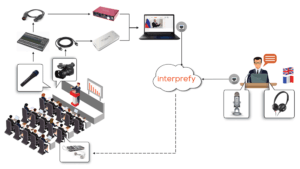
Interprefy allows interpretation of multiple languages in real time via off-site interpreters located anywhere.
COVID-19 has changed how the world is meeting, but it hasn’t changed many of the elements that go into a successful event. Before the pandemic, planners were opting for remote simultaneous interpreting (RSI) as a cost-effective and sustainable way to break down language barriers — and improve event diversity and inclusion. With events moving online, planners still can turn to RSI.
“Nowadays all events are jumping to a virtual equivalent — however, our systems and processes remain exactly the same,” said Richard Roocroft, director of global sales for Interprefy, a cloud-based interpreting platform with years of experience and backed by a team spread over four continents.
RSI, which Interprefy has been doing for more than five years, allows interpretation of multiple languages in real time via off-site interpreters located anywhere in the world. Attendees listen to keynotes and sessions in the language of their choice through the Interprefy app or through radio headsets. RSI simply requires a stable internet connection; with mobile-only events happening today with 4G hotspots, and the world quickly shifting toward 5G, there is little worry about at-home or venue connection capabilities.

Using Interprefy, attendees listen to keynotes and sessions in the language of their choice through the Interprefy app or through radio headsets.
RSI’s benefits, in addition to removing language barriers, include making it easier for planners to organize language services for an event and cutting costs by what it says is an average of 40 percent over usual interpretation expenses. RSI removes layers of costs — and reduces an events carbon footprint — as interpreters are not traveling or being housed and fed. Plus bulky booths packed with interpretation equipment — taking up valuable event floor space — are no longer required.
Scalable and flexible, RSI also can be implemented with ease and integrates with many platforms used for virtual meetings.
“We are technology agnostic,” Roocroft told PCMA. “So, whether a client chooses Intrado, Zoom, WebEx, ON24, Microsoft Teams, BlueJeans and so on, it is still possible to provide remote interpretation services via Interprefy.”
Roocroft says that if a simultaneous interpreter exists anywhere in the world for a given language, Interprefy will be able to find the person and provide that language option at an event.
A technology conference that Interprefy worked on in 2018 was delivered in 13 languages by 102 interpreters. Last year, Interprefy set up RSI in four languages with just two weeks’ notice for content delivery network Akamai Technologies — with a cost savings of 30 percent over traditional language setups, Roocroft said.
“We were very impressed with the professionalism of the Interprefy team, the speed of delivery, and the quality of the interpreters,” Yap Xin Hong, an event specialist for Akamai Technologies, said in feedback about the event posted on the Interprefy website.
Despite trying to grow their global reach, events are frequently in only one language, limiting their diversity and inclusion. RSI, Roocroft notes, is one way to ensure a diverse group of attendees feels included, whether meeting online or off.

